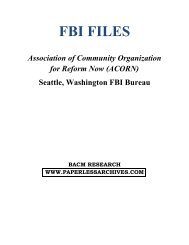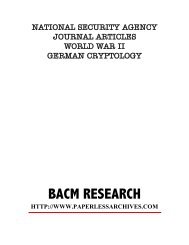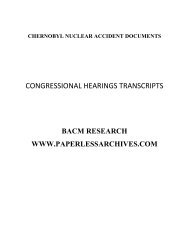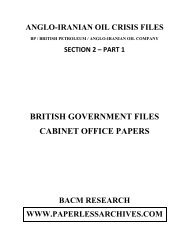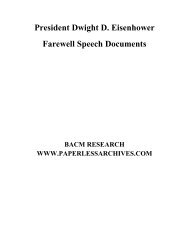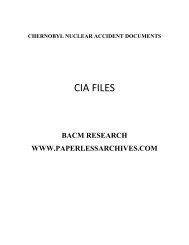Vietnam War: Forest Fire as a Military Weapon - Paperless Archives
Vietnam War: Forest Fire as a Military Weapon - Paperless Archives
Vietnam War: Forest Fire as a Military Weapon - Paperless Archives
You also want an ePaper? Increase the reach of your titles
YUMPU automatically turns print PDFs into web optimized ePapers that Google loves.
SECRET<br />
6. Effectiveness of foliar spray is reduced if applied during a dry period when the vegetation is under moisture<br />
stress. Effectiveness of a soil-applied herbicide is optimum if applied during a period when it is moved into the<br />
soil by moderate rainfall at a time when plants are actively growing.<br />
7. Many species of trees and shrubs. particularly in tropical regions, are resistent to all commonly used herbicides<br />
Such species have been little affected by defoliation or desiccation sprays at the various locations we have<br />
observed, In mixed evergreen forests and shrub types, however, the resistant species make up a small proportion<br />
of the total vegetative cover and can be ignored in planning desiccation treatments.<br />
8. In general, higher dosages of systemic herbicides were required in humid tropical are<strong>as</strong> for effective desiccation<br />
of groundstory vegetation than in drier are<strong>as</strong>.<br />
Timing of Desiccation Treatments<br />
Desiccation treatment aims at producing the maximum possible amount of dry ground fuel by the time of burning.<br />
Where possible. the time requirements for effective desiccation should be considered before deciding when to burn. However,<br />
military considerations and restrictions on choice of weather suitable for burning may leave little latitude in planning<br />
"the sequence of desiccation and burning operations.<br />
Use of herbicide desiccants must be geared to the yearly patterns of both precipitation and temperature. Consequently,<br />
timing of operations will not be exactly the same in any two climates. The following list of requirements for effective<br />
herbicide desiccant application will supplement the recommendations listed in Appendix B for each of the climates.<br />
Planning of desiccation operations can be b<strong>as</strong>ed on the readily available records of average monthly precipitation and temperature-the<br />
same records used for cl<strong>as</strong>sifying each climate. Remember, the weather of any year at a location may differ<br />
considerably from the averAge. Consequently, any additional information that can be obtained concerning typical variations<br />
for each month at the location will be of benefit in selecting the best month for each treatment. Also, the actual dates ot<br />
herbicide application should be adjusted slightly from the planned dates if current weather makes such changes advisable.<br />
Following are the requirements to be met, <strong>as</strong> far <strong>as</strong> possible, in planning herbicide desiccant treatments (references to<br />
months for treatment apply to the Northern Hemisphere):<br />
I<br />
Aerial spraying of systemic herbicides, including both defoliating and desiccating treatments, should be done<br />
when woody plants are in their most active growth stage-near the time when new leaves become fully formed.<br />
Growth processes for all species are restricted by deficient soil moisture and by low temperatures, acting singly<br />
or in combination.<br />
Air temperature: Monthly daily mean should be above 600 F., but spraying can be done when average<br />
} daily mean is between 500 and 600 if the spray date must be advanced to allow an adequate drying period before<br />
burning.<br />
Under climates having most months, or all months, with average daily means above 600 F., the best spray<br />
months are from spring (March) through the summer, provided precipitation requirements are met.<br />
S<br />
i<br />
SECRET




